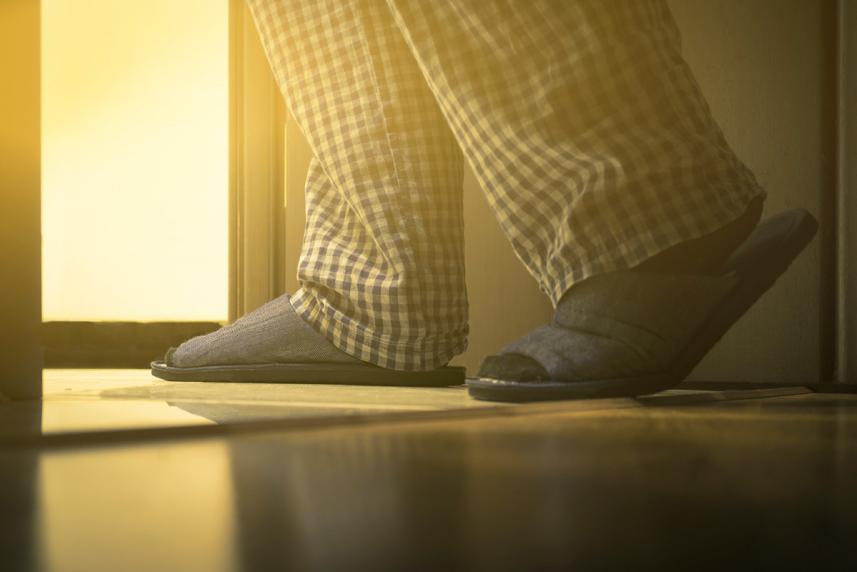Why you might be waking up at night to use the bathroom
Getting up to use the bathroom several times a night is no fun. And it could be a sign of serious health concerns. Here’s what to know.

Do you get up more than once at night to use the bathroom? Does it happen often? You may have nocturia, which is a frequent need to urinate during the night. While it’s a common condition, nocturia can be a sign of something more serious.
Nocturia is a silent struggle for many adults in the U.S. While you can have it at any age, nocturia is most common in people over the age of 60, especially men. In fact, it’s estimated that nearly half of all men in their 70s wake up at least twice a night to urinate, according to the Sleep Foundation.
Studies also show that the condition can contribute to other health woes, including fatigue, depression, and even diabetes.
Here’s a closer look at what causes nocturia and how it can affect your health. Plus, you’ll find some proven strategies to help you sleep better (and use the bathroom less) at night.
Why do I have to go more often at night?
Going to the bathroom more than once at night can be closely tied to urinary incontinence (UI), or the loss of bladder control. It might also be associated with:
- Congestive heart failure
- Diabetes
- Enlarged prostate gland in men
- Kidney problems
- Medications such as diuretics, which help rid your body of salt and water
- Sleep apnea
- Urinary tract infection
With so many health issues linked to nocturia, it’s worth having a conversation with your doctor. They can help you figure out the root cause and determine the right treatment for you.

Call your primary care provider to schedule an appointment. If you don’t have a PCP, you can use Find a Doctor on hmsa.com to search for a participating provider near you.
How can having to go a lot at night affect my overall health?
It’s no surprise that using the bathroom a lot during the night can mess with your sleep quality. And when you don’t get a good night’s rest, it’s harder to function the next day. You may feel sleepy or crabby.
Chronic poor sleep can also increase the chances of heart disease, diabetes, dementia, and other conditions.
Trips to the bathroom in the middle of the night can also increase your chances of falls and fractures, according to a 2020 study in the Journal of Urology. One safety tip: Make sure to use nightlights in your hallway and bathroom.
How can I cut back on the number of times I use the bathroom each night?
There’s no cure for nocturia. But you can make several changes to your daily habits to ease symptoms. Here are four things you can do right now:
1. Mind your fluid intake.
Keep a diary of what you’re drinking, how much, and when you’re drinking it. You may be contributing to your nighttime urges and not even realize it. Try these tips to adjust your habits:
- Drink the fluids you need, like water, to stay hydrated during the morning, afternoon, and early evening.
- Avoid drinking anything within two hours of bedtime.
- Skip the alcohol and limit caffeine, especially in the evening. Both can act as diuretics that fill your bladder with more urine.
2. Say no to salt.
You may be less likely to wake up to go to the bathroom at night if you cut back on salt. Experts aren’t completely sure why this is the case. But research has shown that consuming less salt can calm the symptoms of an overactive bladder.
3. Put your feet up more often.
Do you have swelling in your feet, ankles, and legs due to fluid buildup? Prop up your legs in the evening. Otherwise, the fluid will be reabsorbed into your bloodstream while you sleep, adding to your need to go to the bathroom.
Wearing compression stockings and taking an afternoon nap can also help, according to the Urology Care Foundation.
4. Set yourself up for a good night’s sleep.
When you sleep soundly, you may wake up fewer times to go to the bathroom. Here are some ways to make that happen:
- Don’t exercise in the evening. When you work out, that adrenaline jolt can linger and keep you awake.
- Keep your bedroom cool, dark, and quiet. If traffic, a snoring partner, or other sounds bother you, try a white noise machine.
- Limit screen time before bedtime. About an hour before you turn in, power down your computer, smartphone, and TV.
- Create a relaxing pre-sleep ritual. Read a novel, do deep-breathing exercises, meditate, or write in a journal.
- Go to the bathroom one last time before you tuck yourself in.
If you think you may have nocturia, talk to your primary care provider. They’ll help you decide on the best steps for treatment. That could include referring you to a urologist, a doctor who specializes in conditions that affect the urinary tract.
Additional sources:
Nocturia: Sleep Foundation
Medical causes: Cleveland Clinic
Health risks of poor sleep: Johns Hopkins Health
Falls and nocturia: The Journal of Urology
Salt and nocturia: Neurourology and Urodynamics
Leg swelling: Urology Care Foundation
H3832_8750_848451_5MS541_24_C
© 2023, Linkwell Health, Inc. All content owned or licensed by Linkwell Health, Inc. All rights reserved.


